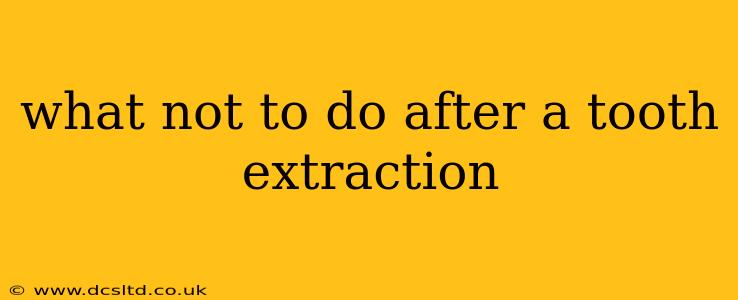Losing a tooth, whether due to damage or planned extraction, is a significant event. Proper post-extraction care is crucial for preventing complications and ensuring a smooth recovery. This guide outlines the key things to avoid after a tooth extraction to facilitate optimal healing.
What Not to Do Immediately After a Tooth Extraction
The first few hours post-extraction are critical. Here's what to avoid:
- Don't Spit: This can dislodge the blood clot that forms to protect the extraction site, leading to a painful and potentially serious complication called "dry socket." Instead, gently blot your mouth with gauze.
- Don't Rinse Vigorously: Avoid forceful rinsing, gargling, or swishing for at least 24 hours. Gentle rinsing with saltwater (after the initial 24 hours) is recommended to help keep the area clean.
- Don't Smoke: Smoking significantly increases the risk of dry socket and impedes healing by restricting blood flow to the extraction site. Nicotine also contains irritants that can further damage the healing tissues.
- Don't Touch or Probe the Extraction Site: Resist the urge to touch, poke, or prod the extraction site with your tongue or fingers. This can dislodge the blood clot and introduce bacteria.
- Don't Use a Straw: The sucking action created by using a straw can also dislodge the blood clot. Avoid straws for at least a week.
- Don't Eat or Drink Hot Foods or Drinks: Hot liquids can dilate blood vessels, potentially leading to more bleeding and increased discomfort. Stick to cool or room-temperature foods and beverages.
- Don't Engage in Strenuous Activity: Avoid intense physical activity for at least 24 hours. This prevents increased blood pressure and the potential for excessive bleeding.
What Not to Do in the Days Following Tooth Extraction
The recovery period extends beyond the immediate post-extraction hours. Here are some important things to avoid:
- Don't Neglect Pain Medication: Follow your dentist's instructions for pain medication. Don't underestimate the pain, and don't stop taking medication prematurely, even if you feel better.
- Don't Consume Alcohol: Alcohol can increase bleeding and interact negatively with pain medication. It's best to avoid it entirely until you're fully recovered.
- Don't Eat Hard or Crunchy Foods: Avoid biting into hard foods such as chips, nuts, or popcorn. Stick to soft foods like yogurt, applesauce, mashed potatoes, and soup for the first few days. Gradually reintroduce firmer foods as your mouth heals.
- Don't Neglect Oral Hygiene (But Be Gentle): While you need to avoid vigorous rinsing initially, you should still maintain good oral hygiene. Gently brush and floss around the extraction site, avoiding direct contact with the area.
- Don't Ignore Swelling or Excessive Bleeding: While some swelling and minor bleeding are normal, significant swelling or persistent bleeding requires immediate attention from your dentist.
What if I Experience Dry Socket?
Dry socket (alveolar osteitis) is a painful complication that can occur when the blood clot at the extraction site is dislodged or fails to form properly. If you experience intense pain several days after your extraction, along with a bad odor or taste, contact your dentist immediately. This is a serious condition requiring prompt treatment.
What If I Have Questions or Concerns?
Your dentist is the best source of information regarding your specific post-extraction care. Don't hesitate to contact their office if you have any questions or concerns throughout your recovery period. Careful adherence to their instructions will ensure a successful healing process.
